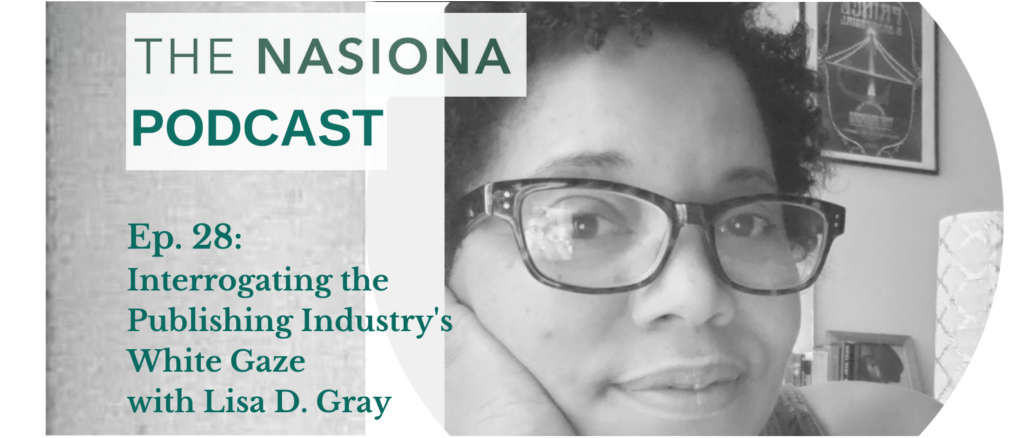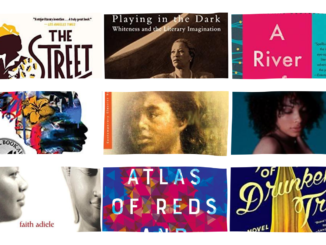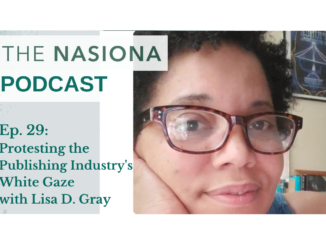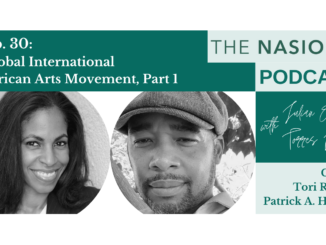
Listen to our 2-part conversation with Lisa D. Gray on The Nasiona Podcast‘s episode 28 “Interrogating the Publishing Industry’s White Gaze,” and episode 29 “Protesting the Publishing Industry’s White Gaze,” which are both part of our Deconstructing Dominant Cultures Series.
You can also find our podcast episodes on Apple Podcasts, Spotify, Google Play Music, iHeartRadio, and Stitcher.
Episode 28: Interrogating the Publishing Industry’s White Gaze
Beware of the white gaze. In this episode, Lisa D. Gray, founder of Our Voices Our Stories SF, joins me to stare down this omnipresent white gaze, which is prevalent in every space, in every industry, in every community of this white supremacist country. In particular, we place the publishing industry in the interrogation room and make our list of demands.
We discuss how we can hold those wielding power in the industry accountable when they say that publishing does not have a diversity, equity, and inclusion problem. We examine how Black and other women of color writers can be centered and seen and how we can unearth and mine underrepresented voices. We look at the policy, structural, institutional, and systemic barriers. We criticize the usual responses by the industry for why they don’t tend to publish books by Black, Indigenous, and People of Color. We call out the industry’s performative and optical responses when dealing with diversity, equity, and inclusion. We challenge the myths forwarded by the industry about Black and brown communities, and much more.
This is part 1 of a 2-part series where we aim to disrupt the publishing industry’s ‘old white boys’ club, and center, elevate, and amplify Black and other People of Color writers, especially women.
As we try to impact equity in publishing and writing, one critical thing we can all do is buy and read books written by Black and other people of color. Read this editorial by Lisa D. Gray for her critique of the publishing industry and her book recommendations.
Guest
Lisa D. Gray opens doors and helps other writers of color claim space in writing and publishing by curating several reading series in the Bay Area. She established Our Voices Our Stories SF (OVOSSF) in 2014 as a way to amplify and elevate the voices of women writers of color. The OVOSSF platform allowed her to showcase more than 20 emerging writers and interview authors Natalie Baszile, Renee Swindle, Elmaz Abinader, Jacqueline Luckett, and Tayari Jones. Lisa won the 2018 Edgar Award named for Robert L. Fish and the Henry Joseph Jackson Prize for Distinguished Fiction in 2014. She was a Fellow at the San Francisco Writers Grotto where she is now a member, and has earned writing scholarships to attend The Fine Arts Works Center, The Voices of Our Nations Foundation, and the Vermont Studio Center where she completed a residency. She is currently a fellow at The Ruby San Francisco and holds degrees in English and Creative Writing from Spelman College and Mills College. Lisa believes it is necessary for Black women and women of color to write and share our stories so that others do not erase or control our narratives. She is completing her first novel, Stolen Summer, and is in search of an agent and publisher for her collection of short stories that focuses on Black children coming of age from the 1950s to present day.
Twitter: @ovossf and @randomlisasf
Instagram: @ovossf and @randomlisasf
Host
Julián Esteban Torres López (he/him) is a bilingual, Colombia-born journalist, publisher, podcaster, author, researcher, educator, editor, and culture worker with Afro-Euro-Indigenous roots. He’s a Sr. DEI Consultant at Yardstick Management. Before founding the social justice storytelling organization The Nasiona, he ran several cultural and arts organizations, edited journals and books, was a social justice and public history researcher, wrote a column for Colombia Reports, taught university courses, and managed a history museum. He’s a Pushcart Prize and Best Small Fictions nominee and has written two books on social justice. Torres López holds a bachelor’s in philosophy and in communication and a master’s in justice studies from University of New Hampshire and was a Ph.D. candidate at University of British Columbia Okanagan, where he focused on political science and Latin American studies.
The Nasiona Podcast amplifies the voices and experiences of the marginalized, undervalued, overlooked, silenced, and forgotten, as well as gives you a glimpse into Othered worlds. We focus on stories that explore the spectrum of human experiences—stories based on facts, truth-seeking, human concerns, real events, and real people, with a personal touch. From liminal lives to the marginalized, and everything in between, we believe that the subjective can offer its own reality and reveal truths some facts can’t discover. Hosted, edited, and produced by Julián Esteban Torres López.
Please follow The Nasiona on Twitter, Instagram, and Facebook for regular updates: @TheNasiona
Original music for The Nasiona Podcast was produced by the Grammy Award-winning team of Joe Sparkman and Marcus Allen, aka The Heavyweights.
Joe Sparkman: Twitter + Instagram. Marcus Allen: Twitter + Instagram.The Nasiona Magazine and Podcast depend on voluntary contributions from readers and listeners like you. We hope the value of our work to our community is worth your patronage. If you like what we do, please show this by liking, rating, and reviewing us; buying or recommending our books; and by financially supporting our work either through The Nasiona’s Patreon page or through Julián Esteban Torres López‘s Ko-fi donation platform. Every little bit helps.
Thank you for listening and reading, and thank you for your support.





2 Trackbacks / Pingbacks
Comments are closed.